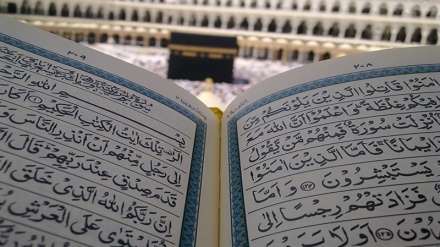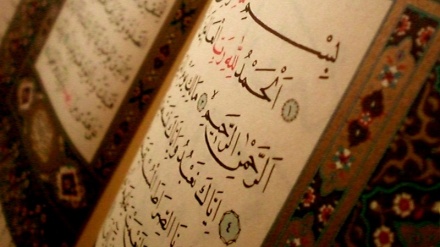Path towards Enlightenment (1027)
Salaam, and welcome to our latest episode of “Path towards Enlightenment”, which is an endeavour to make you and us familiar with an easy and fluent explanation of God’s Final Scripture to all mankind, the holy Qur’an that was revealed to the Last and Greatest of all Messengers, Prophet Mohammad (blessings of God upon him and his progeny).
As you know we have embarked upon explanation of “Surah Qalam” – the number 68 in the serial order of compilation of the holy Qur’an. Revealed in Mecca, it has 52 Ayahs and opens with a single discrete Arabic letter “Noon” and the Divine Oath by the instrument of “Qalam” or “The Pen”, as well as all knowledge that people are able to preserve and communicate thereby. It enumerates the noble characteristics of the Prophet of Islam and exhorts him to patience and steadfastness while rejecting the accusations of his foes who tried to mock him as insane. It exposes the vices of the enemies of Islam and referring to the inevitability of Resurrection and Final Judgement warns them of Divine Wrath.
A statement from the Prophet speaks of Divine rewards for those who recite Surah Qalam (regularly), while the Prophet’s 6th Infallible Heir, Imam Ja’far as-Sadeq (AS) says recitation of this Surah whether in the obligatory or supererogatory ritual prayers shall be immunity from the pressures of the grave for an observant Muslim.
We continue from where we left you last Friday and here are Ayahs 34, 35, and 36:
“Indeed for the Godwary there will be gardens of bliss near their Lord.
“Shall We then treat those submit [to Us] as [We treat] the guilty?
“What is the matter with you? How do you judge?”
If you remember, in our explanation of the previous Ayahs of this Surah last week while referring to the disaster that befell a flourishing garden because of the greed of its owners who later repented and availed of Divine Forgiveness we had said that sincere repentance is accepted in the Divine Court and results in blessings. In other words, Allah’s Infinite Mercy provides wrongdoers the opportunity to repent, rectify beliefs, and make amends before death and closure of the doors of repentance.
The Ayahs which we recited to you now draw a comparison between the righteous people and the evil-doers, saying that those who do good deeds in the transient life of the mortal world are granted vast gardens in Paradise full of delicious fruits and other bounties that are free from pests and never wither.
It is against the principle of justice to treat the virtuous and the vicious equally, especially on the Day of Resurrection when the final judgement takes place after much mercy has been shown by the Lord Most High. Thus, it is an illusion for those who died in the state of unbelief and those who never repented of their sins to think that they will also be admitted to Paradise. They should know that Divine Judgement, unlike the doubtful verdicts issued by worldly courts, is flawless and without the least error.
From these Ayahs we learn that:
- In Afterlife it is virtue that counts and brings to fruition the good deeds done during life with faith in God and His commandments.
- The wealth of the world cannot buy rewards in Afterlife and does not save unbelievers and unrepentant sinners from Divine punishment.
- Justice is among the fundamental principles of Islam and Divine verdicts on the Day of Judgement are perfect and flawless without the least error.
In conclusion of this week’s episode of Path towards Enlightenment, let us listen to Ayahs 37, 38, 39, 40, and 41 of Surah al-Qalam:
“Do you possess a scripture in which you read:
“That you shall indeed have in it [in the next world] whatever you would like?
“Or do you have a pledge binding on Us until the Day of Resurrection, that you shall indeed have whatever you decide?
“(O’ Prophet) Ask them (the disbelievers) which of them will vouch for that!
“Or do they (the disbelievers) have any partners [they ascribe to Allah]? Then let them bring their partners, if they are truthful.”
As further refutation of the misconstrued hopes of the disbelievers and unrepentant sinners that they too would have a share of rewards in Afterlife, the Almighty Creator questions them to bring proof of their falsified claim since neither any special scripture was sent to them to guarantee them in the next world whatever desire, nor they have any Divine pledge assuring them till Judgement Day of continuation of anything they like and the facilities they had enjoyed during life. They are totally devoid of truth as is evident by the partners they used to ascribe to the One and Only Creator Who is far too glorious to have the need for any associates.
These Ayahs teach us the following points:
- One should be careful and cautious into being trapped in illusion and wishful thinking regarding any share of Paradise without having the necessary belief and inability to avoid sins or ever repenting of them.
- Allah’s Infinite Mercy is for those who rectify their wrong beliefs and repent of their sins.
- Judgrment about the fate of humans is solely related to Allah and nobody is entitled to judge about own self or that of others.
RM/AS/SS


